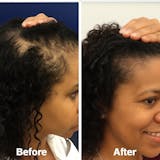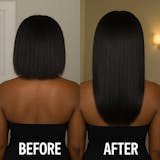Why Your Scalp Feels Dry This Fall

Why Your Scalp Feels Dry This Fall
As the crisp air moves in and humidity drops, you may notice something unexpected — your scalp feels tight, flaky, or itchy. This seasonal dryness is more than a minor irritation. When the scalp’s natural oil barrier is disrupted, it can trigger flakes, dandruff, and even slowed hair growth.
Think of your scalp as the foundation of your hair’s health. When it’s dry, the roots can’t absorb nutrients effectively, leading to brittle strands and shedding. The good news? A few simple shifts in your fall routine can bring your scalp back into balance.
4 Common Causes of Fall Scalp Dryness
- Low Humidity Levels: Cooler weather brings drier air, which pulls moisture from your scalp faster. Without enough natural oil production, your scalp loses hydration and becomes tight or flaky.
- Indoor Heating: Once heaters start running, indoor air loses humidity. This dry air depletes your scalp’s moisture even more, leading to itchiness and irritation.
- Hot Showers and Styling Tools: Hot water and direct heat from styling tools (like blow dryers and flat irons) can strip away your scalp’s protective layer of natural oils, leaving it vulnerable.
- Product Buildup: Richer fall hair products—heavy creams, oils, and leave-ins—can accumulate on the scalp, blocking pores and preventing natural oil flow.
Learn more: Scalp Care 101: How to Soothe Itching, Dandruff, and Promote Growth
The Natural Fix: Moisture, Balance & Circulation
- Use a gentle cleanser: Choose a sulfate-free shampoo or cleansing oil that removes buildup without stripping your scalp.
- Incorporate nourishing oils: Oils like castor, jojoba, and coconut replenish lost moisture while sealing the scalp barrier.
- Boost circulation: Rosemary, peppermint, and caffeine stimulate blood flow, helping nutrients reach the follicles for stronger growth.
- Protect your environment: Use a humidifier indoors, limit hot showers, and sleep on satin to preserve hydration overnight.
Your Fall Scalp-Care Routine
- Cleanse (2–3 times a week) – Rinse with lukewarm water and a gentle shampoo.
- Massage in a scalp oil – Use a blend infused with rosemary, peppermint, clove, and caffeine to nourish roots and calm dryness.
- Lock in hydration – Apply a few drops of lightweight oil (like Seddy Anti-Frizz or Pre-Wash Nourishing Oil) through your strands.
- Protect overnight – Wrap your hair with a satin bonnet or use a silk pillowcase.
Why Scalp Health = Hair Growth
A dry scalp isn’t just uncomfortable — it can slow down your hair’s natural growth cycle. When follicles are dry or inflamed, they struggle to produce healthy strands. By maintaining moisture and improving circulation, you’re helping each follicle stay active and strong.
From the Seddy Family
At Seddy, we’re passionate about helping you build a scalp-care routine that lasts. Our Hair Growth Oil blends rosemary, peppermint, clove, caffeine, argan, and castor oil — all known to hydrate, soothe, and strengthen.
It’s designed to:
- Replenish dry scalp moisture
- Calm irritation and flaking
- Support stronger, thicker hair over time
FAQs About Dry Scalp in the Fall
1. Why does my scalp flake more during fall?
The drop in humidity and increase in indoor heating reduce your scalp’s natural moisture, causing flaking and tightness.
2. Can oils really help fix a dry scalp?
Yes! Natural oils like castor, jojoba, and rosemary help restore the scalp’s barrier, prevent water loss, and soothe irritation.
3. How often should I oil my scalp in colder weather?
1–2 times per week is ideal. Be consistent rather than overusing oil — your scalp loves balance.
4. Should I exfoliate my scalp?
Yes, once every 1–2 weeks. Use a gentle scalp scrub or a massager brush to remove buildup and improve circulation.
5. Can a dry scalp cause hair loss?
In severe cases, yes. Chronic dryness can inflame follicles and lead to breakage or shedding. Regular hydration and scalp massages help prevent this.
6. Does drinking more water help with scalp dryness?
Absolutely. Internal hydration supports your scalp’s ability to produce natural oils. Aim for at least 8 glasses of water daily, especially during colder months when dehydration is common.
7. What’s the difference between dandruff and dry scalp?
A dry scalp flakes due to lack of moisture, while dandruff is usually caused by excess oil and a yeast imbalance. Dry flakes are small and white; dandruff flakes are larger, oily, and often accompanied by itching.
8. Can diet affect scalp health?
Yes — nutrient deficiencies, especially in omega-3s, zinc, and vitamins A, D, and E, can worsen dryness. Include foods like salmon, nuts, and leafy greens to keep your scalp nourished.
9. Is it bad to wash my hair less often in fall?
Not necessarily. Washing too frequently can strip natural oils, but skipping washes for too long can lead to buildup. Finding balance — cleansing 2–3 times a week — helps maintain scalp health.
10. Do protective styles make dry scalp worse?
They can if the scalp isn’t moisturized first. Always oil your scalp before and during protective styles like braids or twists to avoid dryness and itching.
11. Can stress cause scalp dryness or flaking?
Yes. Stress affects hormone levels and can disrupt sebum production, leading to a drier scalp. Pair your scalp care routine with relaxation techniques like massage or aromatherapy.
12. How long does it take to fix a dry scalp?
With consistent care, most people notice improvement in 1–2 weeks. However, chronic dryness may take a month or more to fully rebalance.
13. Should I avoid certain ingredients during fall?
Yes. Avoid harsh sulfates, alcohol-based sprays, and overly fragranced products — they strip moisture. Opt for products labeled “moisturizing” or “nourishing.”
14. Can a scalp massager help with dryness?
Definitely. Scalp massagers boost blood flow, distribute natural oils, and gently exfoliate dead skin — perfect for restoring balance during fall and winter.
15. Is it okay to use essential oils directly on my scalp?
No — always dilute essential oils like rosemary or peppermint with a carrier oil (such as castor or jojoba). Direct use may cause irritation or sensitivity.












